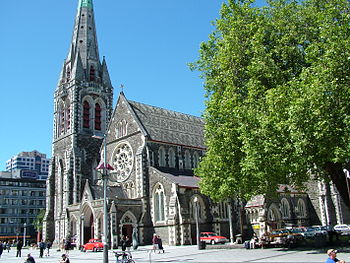 |
| Christchurch Cathedral, Christchurch, NZ (Wikipedia) |
Christchurch is poised to benefit from the opportunities afforded by the "100 Resilient Cities" initiative after being chosen as one of 33 cities from 400 applicants to pilot the introduction of the network.
"Post-disaster, the focus on resilience is a given in the hard infrastructure - pipes, roads and buildings," says Christchurch Mayor Lianne Dalziel.
"But it's not necessarily a given in terms of what makes a city a city - namely its people."
"The 100 Resilient Cities Network gives us a framework for combining both. When we look at pipes, buildings and roads, we can see what a more resilient infrastructure looks like - it will readily absorb the impact of a future event, maintaining essential functions and will more easily restore to full functionality. A resilient community or series of communities is not so easy to define."
The Rockefeller Foundation sought cities facing unique threats and challenges, from climate change impacts and natural disasters, to public health threats and housing crises.
Defining resilience as "The ability of a city to withstand chronic stresses and acute shocks while still maintaining essential functions and recovering quickly and effectively," it is clear to see why Christchurch was a leading candidate.
Winning cities receive membership in the 100 Resilient Cities information-sharing network, along with a $1 million grant to hire a Chief Resilience Officer and to create a resilience plan, along with tools for implementation.
"The focus of Rockefeller is really to create a community of practice among cities globally around how we can improve resilience," explains Michael Nolan, Technical Director of Sustainability and Climate Change at Aecom.
"There may be opportunities that link cities around the world with regard to how insurance is considered, or how investment is encouraged to support resilience. It's a very powerful programme in terms of its potential for influence, but also to be involved in that network from its first foundation group, which will expand out to 100 cities over the next few years."
Featuring cities ranging from Melbourne, Los Angeles and Rome, to Dakar (Senegal) and Ramallah (Palestine), the breadth of knowledge and experience encapsulated within the participating cities is clear.
"They've all got a different range of hazards and risks ... and they're all at different levels of progression in responding to those, so there is good learning."
Nolan is confident of the benefits for Christchurch. "The programme is pioneering. It has a very good framework, very attractive financial and network support, and I think the establishment of a Chief Resilience Officer ... is a really smart way to engage and increase activity in these cities."
"Being part of the RC100 Network is critical both in sharing our lessons learned and learning from others," Dalziel adds. "There is no need to re-invent the wheel".
"Some of the principles around building resilience are universal, even though the application may vary from culture to culture. NZ of course has devised some of the resilient technologies - e.g. base isolation - and we send Canterbury engineering graduates throughout the world. The access to international strategic partners is invaluable. Once the platform is established we will have full access to all the tools to assist in our resilience strategy."
A workshop is being held in Christchurch today, bringing together key players to set an agenda for the future of the Rockefeller Foundation process in the city over the next few years.
Nolan says the workshop's purpose is, "To get that conversation and the guidance from all different players, so that it's very much a focus on co-creation. We actually are not as self-sufficient as we once were as communities, nor are we as connected," Dalziel says.
"If we have learned anything from the earthquakes it is actually how much we can do for ourselves for a reasonable period of time depending on how quickly we can access all the resources within our own communities."
Nolan is confident the project has the strong local government and community support to make an impact. "There's a really good steering committee for the project, involving universities and key players within the council and external to support this. But more broadly, there's been a very positive response to being selected, and the benefits will flow for Christchurch."
100 Resilient Cities
Last August, the Rockefeller Foundation called for cities to apply for their new 100 Resilient Cities initiative, providing a $1 million grant to support the chosen cities in increasing their focus and activity on resilience.
The project was inspired by the increasing concentration of populations in urban areas, coupled with greater social, environmental and political instability. A hundred years ago, only 10 per cent of humanity lived in cities. By 2050, that number is poised to increase to 75 per cent.

No comments:
Post a Comment